The Ultimate Guide to MProfileeloxicam Tablets 2.5 mg for Dogs: Indications, Dosing, and Safety
Canine joint disorders, musculoskeletal pain, and inflammation are prevalent conditions that affect the quality of life of dogs across various breeds and age groups. Veterinary medicine has evolved to address these challenges through the development of effective anti-inflammatory and pain-relieving formulations. One such widely used therapeutic is Meloxicam Tablets 2.5 mg for Dogs, a powerful veterinary NSAID (non-steroidal anti-inflammatory drug) designed to combat pain, swelling, and joint degeneration.
In this article, we explore Inflavet tablets in-depth — their formulation, indications, mechanism of action, dosage guidelines, safety profile, clinical research data, and veterinary usage insights. Pet parents and veterinarians alike will find this guide valuable for making informed decisions when managing canine pain and inflammation.
What Are Meloxicam Tablets 2.5 mg for Dogs?
Meloxicam Tablets 2.5 mg are oral veterinary tablets formulated with Carprofen, a well-established NSAID commonly used in canine practice. It is specifically intended for the management of inflammation and pain, especially those associated with osteoarthritis, post-operative recovery, and musculoskeletal injuries in dogs.
Key Composition:
- Active Ingredient: Carprofen
- Form: Oral chewable or standard tablet (depending on manufacturer variant)
- Type: Non-steroidal anti-inflammatory drug (NSAID)
Therapeutic Indications of Meloxicam Tablets 2.5 mg in Dogs
Meloxicam Tablets 2.5 mg are commonly indicated for the following conditions in dogs:
1. Osteoarthritis (Degenerative Joint Disease)
- Alleviates chronic joint inflammation
- Improves mobility and reduces lameness
- Enhances quality of life in aging dogs
2. Post-Operative Pain and Inflammation
- Provides pain relief after orthopedic or soft tissue surgery
- Minimizes inflammation to support faster healing
3. Musculoskeletal Pain
- Effective in treating sprains, strains, and trauma
4. Hip Dysplasia
- Manages inflammation around the hip joint in predisposed breeds
- Offers long-term support in conjunction with other therapies
5. Elbow Dysplasia or Patellar Luxation
- Aids in reducing chronic pain due to skeletal malformation
- Helps in increasing daily comfort and activity
6. Support in Physical Rehabilitation
- Used as adjunct therapy during physiotherapy or hydrotherapy
- Reduces discomfort during mobilization exercises
Mechanism of Action
Carprofen in Meloxicam Tablets 2.5 mg works by selectively inhibiting cyclooxygenase-2 (COX-2) enzymes, which are responsible for inflammation and pain in the body.
Key Benefits of COX-2 Selectivity:
- Fewer gastrointestinal side effects
- Maintained kidney function
- Better safety in long-term use
Proper Use and Dosage Schedule of Meloxicam Tablets 2.5 mg in Canines
Proper dosage and consistent administration of Inflavet tablets are crucial to ensuring safe, effective, and sustained pain relief in dogs. Inflavet, primarily composed of Carprofen, is used to reduce inflammation and manage pain associated with osteoarthritis, musculoskeletal injuries, and post-operative recovery.
This section outlines detailed dosing guidelines, adjustments, tablet strength selection, and administration best practices tailored for veterinary use and responsible pet ownership.
Recommended Dosage Range
The standard dosing protocol for Inflavet (Carprofen) in dogs is:
- 2 mg per kg of body weight per day, which may be:
- Given as a single daily dose, or
- Divided into two doses of 1 mg/kg every 12 hours for improved tolerance in some dogs
This dosing approach is flexible and should be tailored to the individual dog based on clinical response, treatment goals, and veterinary assessment.
Dosage Based on Body Weight
| Pet’s Weight (kg) | Overall Daily Dose (mg) | One-Time Daily Dose (mg) | Twice Daily Dosing (mg) | Appropriate Tablet Strengths |
| 2 – 5 kg | 4 – 10 mg | 1 × 25 mg (split in half) | 1 × 12.5 mg twice daily | 25 mg tablet (quarter/half tablet) |
| 6 – 10 kg | 12 – 20 mg | 1 × 25 mg | 1 × 12.5 mg twice daily | 25 mg tablet |
| 21 – 30 kg | 42 – 60 mg | 1 × 75 mg | 1 × 37.5 mg twice daily | 50 mg + 25 mg tablets |
| 31 – 40 kg | 62 – 80 mg | 1 × 100 mg (adjust as needed) | 1 × 50 mg twice daily | 100 mg tablet or 2 × 50 mg tablets |
| 41 – 50 kg | 82 – 100 mg | 1 × 100 mg + 1 × 25 mg | 1 × 62.5 mg twice daily | 100 mg + 25 mg or combination dosing |
| > 50 kg | Adjust per kg weight | Vet guidance needed | Vet guidance needed | Multiple tablets as per weight calculations |
Administration Schedule
Meloxicam Tablets 2.5 mg can be administered either:
- Once a day (q24h) – convenient for most dog owners
- Twice daily (q12h) – preferred in cases with gastric sensitivity or when a steadier drug plasma level is needed
Tips for Administering Inflavet
- Give with food: Reduces the risk of stomach upset.
- Use chewable tablets (if available): These are palatable and easier to administer.
- Crush or disguise in treats: For dogs that resist direct dosing.
- Ensure complete ingestion: Watch for dropped or spat-out pieces.
- Keep a dosing chart: For multi-pet homes or long-term use, a dosing log helps prevent missed or double doses.
Long-Term Administration Guidelines
When used for chronic conditions like arthritis:
- Start with full dosage for the first 7–10 days.
- If improvement is observed, the vet may titrate to the lowest effective dose (this may be once every 48 hours in some cases).
- Routine liver and kidney function tests every 3–6 months are recommended during long-term therapy.
- Combine with joint supplements, omega-3 fatty acids, or physical therapy for a holistic approach.
Meloxicam Tablets 2.5 mg for Dogs: Safety Concerns and Side Effects
Meloxicam Tablets 2.5 mg, containing the active ingredient Carprofen, are among the most trusted non-steroidal anti-inflammatory drugs (NSAIDs) used in veterinary medicine for dogs. Despite their efficacy and widespread use, it is essential to understand the safety considerations and potential side effects associated with their administration.
General Safety Profile
Meloxicam Tablets 2.5 mg is considered safe for most healthy dogs when administered at the recommended dosage and under veterinary supervision. Its COX-2 selective action means it targets inflammation without significantly affecting COX-1 enzymes, which help protect the stomach lining and maintain kidney function. This selectivity contributes to a lower incidence of gastrointestinal and renal side effects compared to non-selective NSAIDs.
However, as with any NSAID, there are certain risks and contraindications to be aware of.
Common Side Effects
These side effects are usually mild and self-limiting, especially when the medication is given with food:
| Side Effect | Description |
| Vomiting | May occur shortly after administration; feeding with food can reduce this risk |
| Diarrhea/Soft Stool | Occasional GI upset; usually temporary |
| Loss of Appetite | Dogs may eat less during the initial phase of treatment |
| Lethargy | Mild fatigue or change in activity levels may be observed |
Serious Side Effects (Rare but Critical)
While rare, some dogs may exhibit more serious adverse effects, which warrant immediate discontinuation of the drug and urgent veterinary care:
| Serious Reaction | Symptoms |
| Gastrointestinal Ulceration | Black/tarry stools, bloody vomit, abdominal pain, excessive salivation |
| Hepatotoxicity | Jaundice (yellowing of skin or eyes), elevated liver enzymes, pale gums, behavioral changes |
| Nephrotoxicity | Increased thirst or urination, vomiting, lethargy, kidney parameter abnormalities in blood tests |
Precautions Before Starting Inflavet
Before initiating Inflavet therapy, your veterinarian may recommend:
- Baseline blood tests (CBC, kidney and liver panels)
- Urinalysis to assess hydration and kidney function
- Thorough history check to rule out prior drug sensitivities
Contraindications
Meloxicam Tablets 2.5 mg should not be used in dogs with:
- Known allergy to Carprofen or other NSAIDs
- Pre-existing liver, kidney, or gastrointestinal disease
- Concurrent treatment with other NSAIDs or corticosteroids (e.g., prednisone, dexamethasone)
- Pregnant or lactating females
- Puppies under 6 weeks of age
Drug Interactions
Combining Meloxicam Tablets 2.5 mg with certain medications may increase the risk of side effects, especially gastrointestinal bleeding or renal stress.
Use with Caution With:
- Diuretics (e.g., furosemide)
- Aminoglycoside antibiotics (e.g., gentamicin)
- ACE inhibitors (e.g., enalapril)
- Anticoagulants
Always inform your vet of all medications or supplements your dog is taking.
Monitoring During Long-Term Use
For dogs on chronic therapy (e.g., for osteoarthritis), periodic check-ups are essential:
- Every 3–6 months: CBC, liver enzymes, renal panel
- Ongoing evaluation of appetite, behavior, stool quality
- Monitor for signs of subtle discomfort or behavioral changes
Signs You Should Stop Inflavet Immediately
Discontinue the medication and consult your veterinarian if your dog experiences:
- Vomiting blood or dark stools
- Sudden loss of coordination or collapse
- Yellowing of gums, skin, or eyes
- Marked decrease in appetite or water intake
- Unusual aggression, restlessness, or confusion
Best Practices for Safe Use
To maximize the safety and effectiveness of Inflavet:
- Administer with food to reduce stomach upset
- Use exact dosing based on body weight
- Store securely, away from pets and children
Veterinary Perspective on Safety
“Inflavet, like other Carprofen-based NSAIDs, is well-tolerated in the majority of canine patients when used judiciously. The key is to screen the dog’s health beforehand and closely monitor them during therapy.”
— Dr. Anil Dey, DVM, Veterinary Pharmacologist
Clinical Research and Veterinary Insights
Carprofen has been extensively researched for its efficacy and safety in canine patients.
Key Clinical Studies:
1. Veterinary Therapeutics Journal:
- Compared Carprofen vs. Meloxicam in dogs with arthritis
- Carprofen provided quicker onset of pain relief
- Better owner compliance due to palatable tablet form
2. Post-operative Pain Study (Europe):
- 80% of dogs showed marked improvement in recovery when treated with Carprofen after orthopedic surgeries.
Veterinary Practice Feedback
Veterinarians across the globe prefer Inflavet (Carprofen) because of its:
- Proven safety track record
- Efficacy in both acute and chronic conditions
- Adaptability to a wide range of dog sizes
- Ease of administration via chewables
Veterinarian Quote:
“Inflavet has become my go-to NSAID for dogs with joint pain and post-operative recovery. Its tolerability and client satisfaction are consistently high.” – Dr. Neha Sharma, MVSc (Orthopedics)
Alternatives to Inflavet Tablets
While Inflavet is highly effective, there are alternative NSAIDs and supportive treatments:
Other NSAIDs:
- Meloxicam (Metacam)
- Firocoxib (Previcox)
- Deracoxib (Deramaxx)
Supportive Options:
- Joint supplements (e.g., Canitone Joint, Bonilage)
- Physiotherapy and hydrotherapy
- Weight management
- Omega-3 fatty acids (anti-inflammatory support)
Conclusion
Meloxicam Tablets 2.5 mg for Dogs are a reliable and effective solution for managing canine pain, inflammation, and mobility issues, particularly related to osteoarthritis and post-surgical recovery. With a well-established safety record, proven efficacy, and broad veterinary support, Inflavet (Carprofen) remains one of the top choices in anti-inflammatory therapy for dogs.Proper dosing, regular veterinary monitoring, and combining it with supportive care can dramatically improve your dog’s quality of life. As always, consult your veterinarian before starting or changing any treatment regimen.







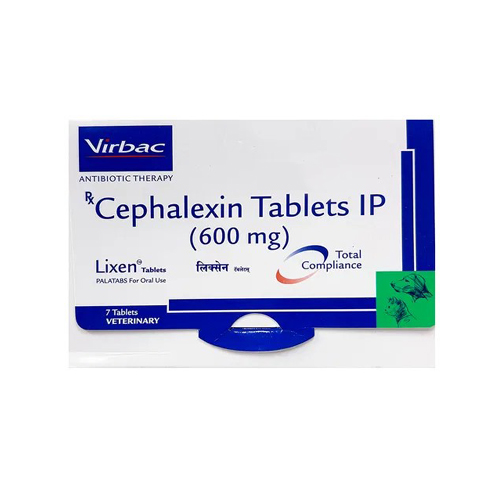
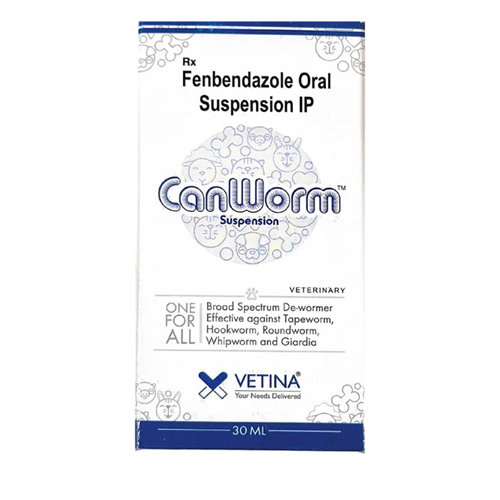



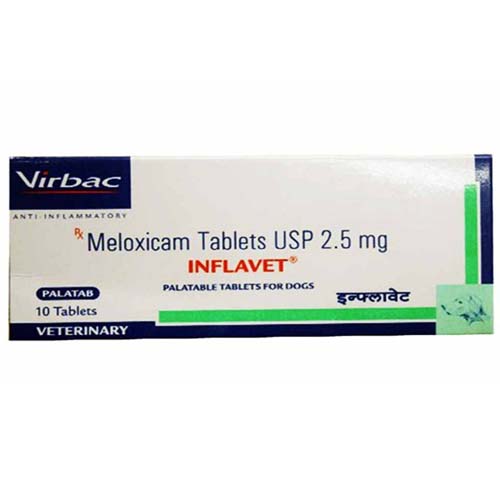
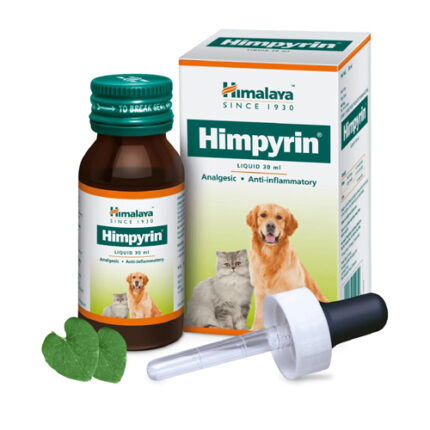
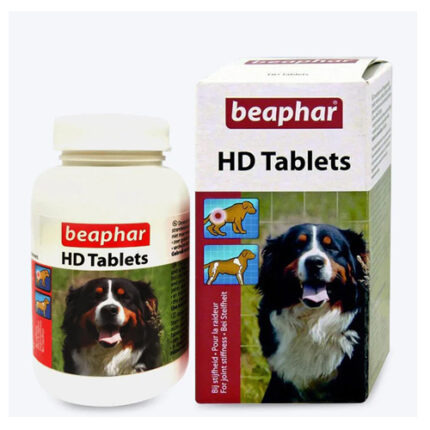
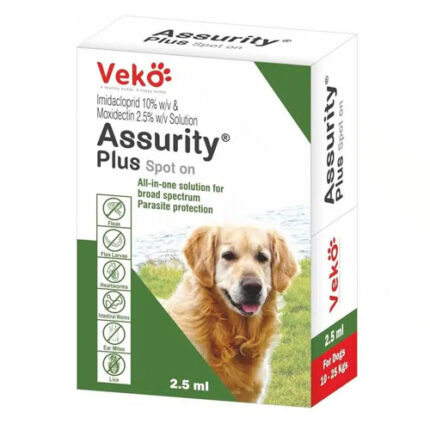
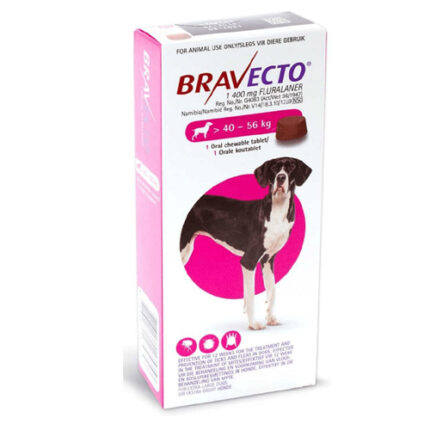

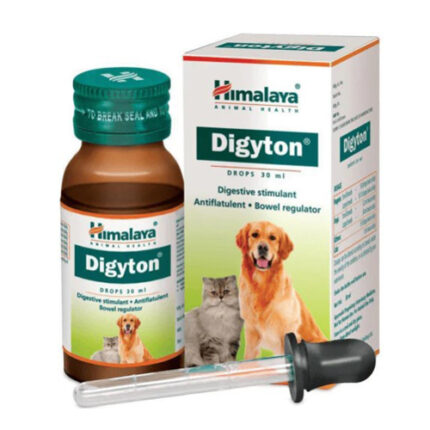
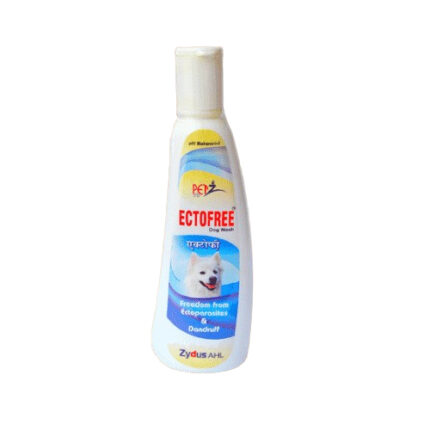
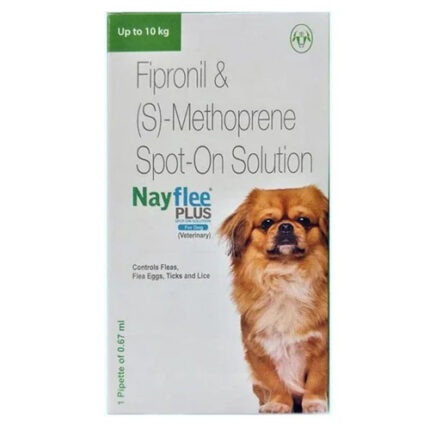
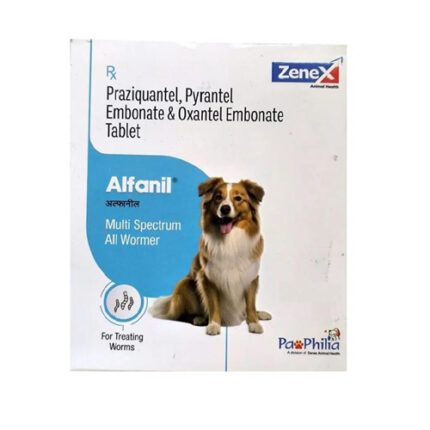

Reviews
There are no reviews yet.